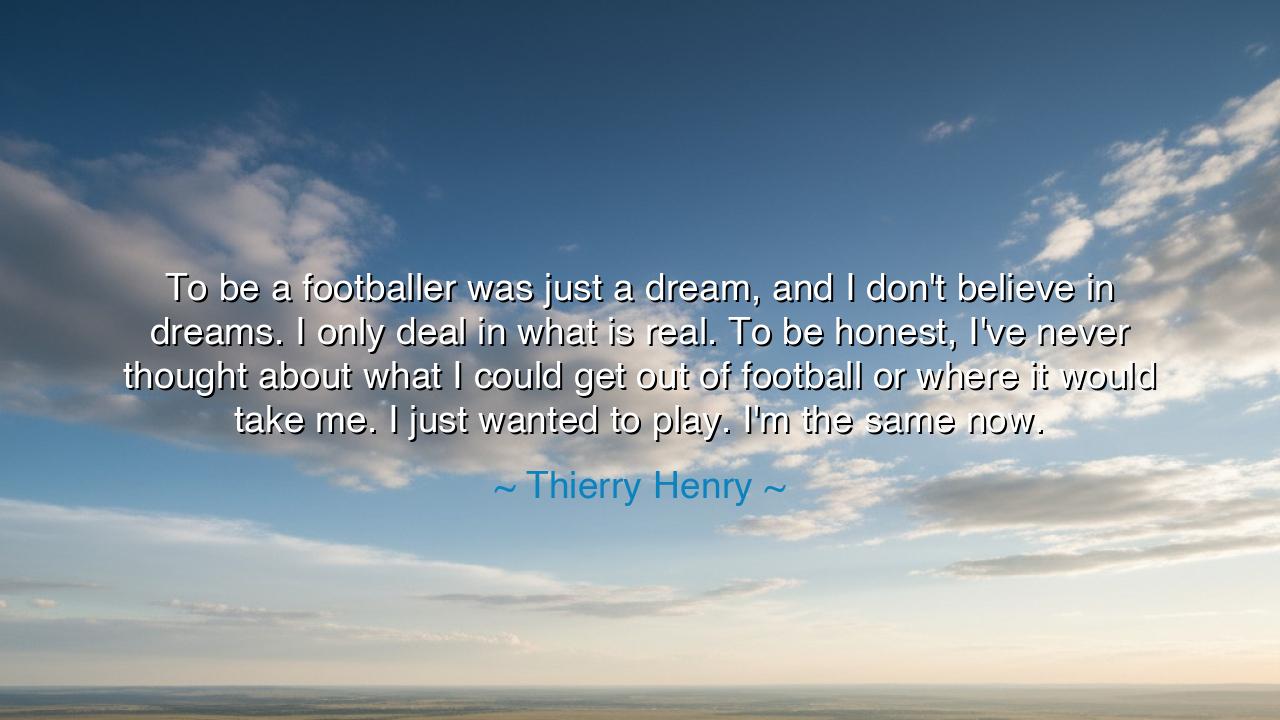
To be a footballer was just a dream, and I don't believe in
To be a footballer was just a dream, and I don't believe in dreams. I only deal in what is real. To be honest, I've never thought about what I could get out of football or where it would take me. I just wanted to play. I'm the same now.






In the powerful words of Thierry Henry, "To be a footballer was just a dream, and I don't believe in dreams. I only deal in what is real. To be honest, I've never thought about what I could get out of football or where it would take me. I just wanted to play. I'm the same now," we encounter a philosophy grounded not in the fleeting nature of dreams, but in the solid, unshakable reality of living with purpose and passion. Henry, a giant in the world of football, offers a rare glimpse into the mind of a true athlete—one who does not chase after glory or rewards, but simply the joy and fulfillment that comes from playing the game. In these words, he unveils a truth about living authentically, focusing not on what the future might bring, but on the present moment—the joy and power of simply doing what one loves.
The significance of this quote lies in its rejection of the concept of dreams as something distant, unattainable, or abstract. In the age of ambition, where people are taught to chase their dreams as if they are intangible stars in the sky, Henry challenges this notion with a perspective that is both liberating and powerful. Dreams, in this sense, are often seen as a path to fame, wealth, or status—goals placed on a pedestal, requiring hard work to reach. Yet Henry reveals that his focus was never on those end goals, but rather on the real act of playing football itself, engaging with the present, and finding fulfillment in the now. This is a reminder that true success often lies not in the achievement but in the journey itself, in the commitment to something deeper than external validation.
Consider the example of Socrates, the great philosopher who sought wisdom not for fame or recognition but for the very pursuit of truth. He did not teach with the intent of creating a legacy for himself, but simply to understand the nature of life, virtue, and knowledge. His pursuit was grounded in the present moment, not in what he could gain from it. Like Henry, Socrates chose not to focus on the distant rewards of his work but on the action itself—the way it shaped his soul and the minds of others. In this same way, Henry’s philosophy invites us to consider what it means to live fully in the moment, to pursue a craft not for the rewards it brings but for the joy of doing it well.
Henry's words also resonate with the wisdom of the ancient warriors, who valued mastery and skill over the spoils of battle. A true warrior, in the days of Homer’s Iliad, fought not for personal gain but for honor, for the art of combat itself. In the same spirit, Henry approached football—not as a means to an end, but as an end in itself. The act of playing, of performing at the highest level, was the reward. True mastery lies not in chasing after riches or fame, but in the dedication to one’s craft. This is the essence of a warrior's life: the commitment to the practice, not the victory or the fame it may bring.
It is also worth noting that Henry’s humility shines through in this statement. He does not boast of what he has achieved or what he could have achieved. He speaks not of records or accolades but of his deep love for the game itself. His words echo the teachings of Confucius, who believed that one should focus on the pursuit of virtue and inner fulfillment rather than the rewards of external recognition. To be truly great, Confucius taught, one must pursue mastery for its own sake, for the joy it brings to the soul, not for what the world might offer in return.
In our own lives, we can learn from Henry's philosophy. Too often, we chase after dreams that are shaped by external expectations—dreams of wealth, power, or status. While these things can provide temporary satisfaction, true contentment comes from the present moment, from engaging fully in the tasks and activities that bring us joy and fulfillment. Like Henry, we must not focus on what we can gain from our efforts but on the real experience of doing what we love. Whether in work, art, relationships, or any other pursuit, the lesson is clear: find purpose in the present, and the rewards will follow naturally, not as a goal, but as a byproduct of genuine passion.
Thus, the great lesson from Thierry Henry is this: live with authenticity and purpose, and focus on the work itself, not on the outcomes. Success will follow when we choose to immerse ourselves in what we love, not for external rewards, but for the joy and mastery that the process itself brings. In the same way that Henry found his calling on the football pitch, we too can find fulfillment in the simple act of dedicating ourselves to our craft, living each day with intention and passion. Let us heed his words: dreams may come and go, but it is the real work—the pursuit of what makes us whole—that defines us.






AAdministratorAdministrator
Welcome, honored guests. Please leave a comment, we will respond soon